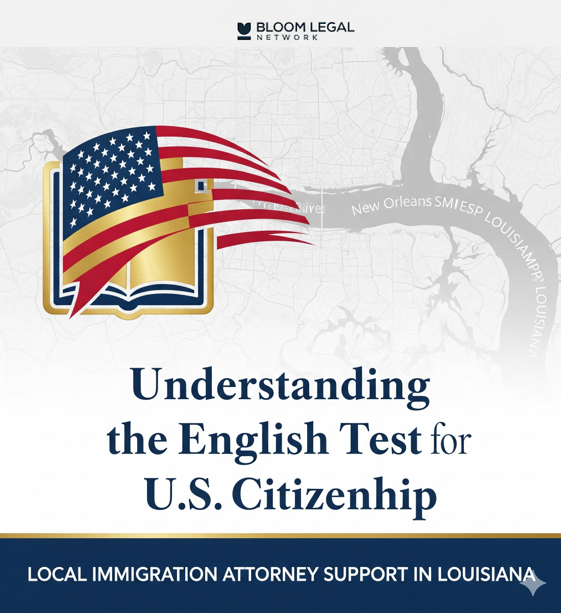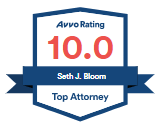What Is the English Test Like for U.S. Naturalization?

Is the citizenship test hard? What do they ask in English?
Becoming a U.S. citizen through naturalization can be life-changing—but many prospective applicants, especially those in New Orleans, Metairie, or Southeast Louisiana, find themselves asking: What’s the English test really like? Is it intimidating? What should I expect?
Here’s the good news: the English portion of the test is designed to be fair and achievable—with preparation. In this guide, you’ll learn how the test works, what sections to expect, and how Bloom Legal Network can connect you with local immigration attorneys to guide you through every step.
The Naturalization English Test: What to Expect
The English portion of your naturalization interview, conducted by a U.S. Citizenship and Immigration Services (USCIS) officer, has three parts:
- Speaking: Your ability to speak English is evaluated throughout the interview as you answer questions about your application (Form N-400). You’ll be asked about your personal background and eligibility, such as your home address or why you want to become a citizen. It’s okay to ask the officer to repeat or rephrase a question. The goal is to demonstrate that you can communicate clearly, not that your English is flawless.
- Reading: You’ll be asked to read up to three simple sentences on a tablet. You only need to read one sentence correctly to pass. The sentences often use vocabulary related to U.S. civics and history. Minor pronunciation errors are acceptable as long as you convey the meaning of the sentence.
- Writing: The officer will read a sentence aloud, and you must write it on a tablet. Similar to the reading test, you only need to write one sentence correctly to pass. While minor errors in spelling, capitalization, or punctuation are usually allowed, the sentence must have the same meaning as the one dictated.
Tips for English Test Success 📝
- Use official USCIS materials: The agency provides a list of vocabulary and sample sentences for both the reading and writing tests.
- Practice: Practice speaking answers to common interview questions. Read the sample sentences aloud until you feel comfortable. For the writing portion, have a friend or family member dictate sentences from the official vocabulary list to you.
- Know the Civics content: The sentences you read and write will often be drawn from the civics test vocabulary. Familiarizing yourself with these topics will help you in both parts of the exam.
Applicants in New Orleans, Jefferson Parish, or St. Tammany Parish often benefit from local community resources like nonprofits and colleges that offer English classes specifically for naturalization. Working with a local immigration attorney through Bloom Legal Network connects you to these valuable resources.
How a Lawyer Can Help
An attorney can be a significant asset during the naturalization process. They can:
- Prepare you: Conduct a mock interview to help you feel more comfortable and confident.
- Review your application: Ensure your Form N-400 is complete and accurate.
- Identify exemptions: Help you determine if you qualify for an exemption from the English test.
Bloom Legal Network connects you with experienced immigration attorneys who can guide you through the naturalization interview process in New Orleans, Metairie, or surrounding parishes.
Ready to Take the Next Step Toward Citizenship?
If you’re preparing for the English portion of your naturalization interview—or if you have questions about your eligibility—Bloom Legal Network can connect you with experienced immigration attorneys across New Orleans, Jefferson Parish, St. Tammany Parish, and the Southeast Louisiana region.
Get guidance from professionals who understand the system, the process, and the local field offices.
📞 Call us at (504) 599-9997
📩 Email us at info@bloomlegal.com
Our attorney network is here to help you move forward—confidently and informed.
FAQs About the English Test for U.S. Naturalization
You may qualify for an exemption from the English test based on age or disability. For instance, if you’re 50 or older and have been a permanent resident for 20+ years, or 55 or older with 15+ years, you may be able to take the civics test in your native language. A disability exemption is also possible with a certified Form N-648 from a licensed medical professional.
Minor errors, such as mispronunciations or omitting short words, are acceptable as long as the meaning of the sentence is clear. USCIS prioritizes comprehension over perfect grammar or spelling.
Yes. If you fail any part of the English or civics test, you will be given a second chance to retest on only the failed portion within 60 to 90 days.






